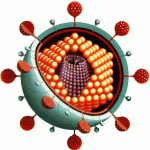Virology
|
28 april 2015 14:34:18 |
| Homoharringtonine, a clinically approved anti-leukemia drug, sensitizes tumor cells for TRAIL-induced necroptosis (Epidemiologic Perspectives & Innovations) |
|
Tweet Background:
One hallmark of cancer cells is their ability to evade physiologic signals causing regulated cell death (RCD). Correspondingly, TRAIL-based therapies to eliminate human cancer cells via enforced induction of apoptosis have been established and represent a promising approach in anti-cancer research. However, due to frequently appearing intrinsic or acquired resistances of tumor cells against apoptosis, TRAIL-based apoptotic strategies for the treatment of cancer patients have shown limited efficacy. As a potential alternative, regulated necrosis (and necroptosis triggered e.g. by TRAIL receptors 1/2) has recently gained considerable attention. Regulated necrosis represents a mode of RCD molecularly distinct from apoptosis whose potential in anti-cancer therapy is almost uncharacterized. Since in most cancer cells survival pathways counteract the effects of TRAIL-induced RCD, sensitizers such as cycloheximide (CHX) are frequently added in cell culture to overcome this problem. Unfortunately, those sensitizers are cytotoxic and therefore not suitable for the treatment of cancer patients. Here, we have alternatively employed homoharringtonine (HHT), a plant alkaloid which was recently approved by the U. S. Food and Drug Administration to treat patients with chronic myeloid lymphoma.
Results:
We show that HHT is an efficient sensitizer for TRAIL-induced necroptosis in multiple human cancer cell lines. In addition, HHT-enhanced TRAIL-mediated necroptosis occurs via the same signaling pathways (involving RIPK1/RIPK3/MLKL) as CHX-enhanced necroptosis. Importantly, consecutive treatment schedules of necroptosis and apoptosis in either combination revealed remarkable additive effects not reached by repetitive apoptotic treatments alone.
Conclusions:
Taken together, our data demonstrate that HHT can replace harmful substances such as CHX to sensitize human cancer cells to TRAIL-induced necroptosis. Thus, HHT represents a promising enhancer in TRAIL-based necroptotic anti-cancer therapies also in patients. |
| 202 viewsCategory: Pathology, Virology |
 Transporter-mediated L-glutamate elimination from cerebrospinal fluid: possible involvement of excitatory amino acid transporters expressed in ependymal cells and choroid plexus epithelial cells (Epidemiologic Perspectives & Innovations) Transporter-mediated L-glutamate elimination from cerebrospinal fluid: possible involvement of excitatory amino acid transporters expressed in ependymal cells and choroid plexus epithelial cells (Epidemiologic Perspectives & Innovations)An epitope tag alters phosphoglycerate dehydrogenase structure and impairs ability to support cell proliferation (Epidemiologic Perspectives & Innovations) 
|
| blog comments powered by Disqus |
MyJournals.org
The latest issues of all your favorite science journals on one page
The latest issues of all your favorite science journals on one page



